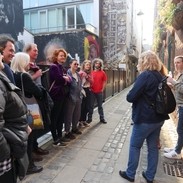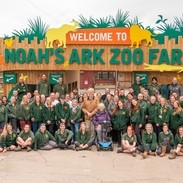VisitBritain/Diensen Pamben

Better Business case study: Laverock Law

You must accept "Targeting" cookies from in order to watch this video, as YouTube automatically sets cookies of this type.
“Everything we do is about the people who come here. And ultimately, of course, that’s good for business, because the more people enjoy and feel welcome by being here, the more they come back”.
Dave Harris-Jones, co-owner
Customer experience goes hand-in-hand with sustainability at Laverock Law Country Cottages and Glamping in Northumberland. Taking to heart the business’ strapline ‘Relax, Rewind, Reconnect’, around 50% of guests are repeat customers who appreciate the way that low impact, local experiences are woven into everything on offer, creating time and space to connect with nature and each other.
Business benefit: Generate connection
Guests get a feel for low carbon living when they stay at Laverock’s North Star Treehouse. Built by local workmen with timber from the local area, it is insulated with sheep’s wool and has metal work produced by a nearby blacksmith.
VisitBritain/Diensen Pamben

The business’ environmental credentials are impressive – from biomass heating using UK-produced sustainable wood pellets, solar energy, EV charging and ethical banking to biodegradable cleaning products, organic linen and waste composting. But it’s the way owners Harvest and Dave Harris-Jones take their guests on the sustainability journey with them that really creates a sense of connection, that drives Laverock Law guests to return year after year.
Motivating visitors to care for the environment and support the local community starts with pre-arrival communications and continues to the welcome grocery pack, which is plastic free and stuffed with locally sourced treats. Laverock also provide information on where guests can buy more of the produce they’ve sampled, as well as info on the bikes they can borrow, plus maps and bus timetables, to encourage car-free days out. A Responsible Visitor Charter shows guests that ‘Living a greener life while staying with us is easy’ and encourages long term changes. Harvest and Dave also encourage their guests to think about the ‘sticky pound’ and spend with nearby businesses to support the local economy. This is also good for their own business too, as the local enterprises similarly cross promote Laverock
Business benefit: Encourage repeat visits
By successfully attracting those visitors who share their values, all year round, Dave and Harvest have also been able to develop a sister business ‘Wild Experiences Northumberland’. A wide variety of low-carbon, outdoor and local experiences give customers plenty of reasons to keep coming back to try something new. These include barefoot walks across the sand to nearby Holy Island, a dark sky astronomy trail, hands on workshops in felt-making, bread-making or bird box building, wellbeing activities and family adventures in the Cheviot Hills. This second business has grown by attracting local residents and tourists staying at other properties in the area make up half of its customers.
Find out more on the VisitEngland Business Advice Hub and Laverock Law
Taking the next steps - Nudge your guests into doing the right thing
The main barrier that prevents your visitors from behaving responsibly is… the extra effort. Asking visitors to engage in an action that conflicts with leisure and relaxation, or that prioritises the future of the planet over the joy they can experience in the current moment isn’t likely to work. Here are some tips to consider instead:
Make it easy: If the main barrier to visitors taking action is effort, then a powerful tactic you can employ is to make sustainable choices easy. Think about where you can present sustainable options in a way that requires zero effort. For example:
Make it easy for your guests to be plastics-free by reminding them to pack their reusable bottle and signpost places they can refill them during their stay/experience
Make it easy for your guests to opt for low carbon transport options by giving them clear and simple instructions on how to get to the main attractions they are visiting
Set it as the default: Setting the responsible option as the default is a step further than making it easy. Defaults can be especially powerful for those choices that your customers don’t pay that much attention to, because they don’t affect their overall experience. When we don’t care that much about a choice, we often prefer to focus our attention on something else and so we avoid effort and go with whatever is set as the default. For example:
Make it easy for your guests to reduce their environmental footprint by changing the default option for your towel changing. Transition to changing towels only on day 3 or 4 of the stay so by default towels are not changed daily. You still leave the option for guests to request daily change (e.g. by calling reception) but by setting no daily change as the default you ensure that towels will be changed only when the guest really wants this.
Make it appealing: Presenting sustainable options as appealing is a very effective way of eliminating the conflict for guests between being responsible and enjoying themselves. Think of benefits or gains that your customers might enjoy and include them in the description or the choice set. For example:
Make it appealing for your guests to opt for a local seasonal food option that leaves higher local economic impact and comes with lower carbon footprint by presenting it with an irresistible description and image in your menu. Use emotionally-laden words and refer to the exceptional taste so that clients opt for it not because it is the responsible choice but because they feel it’s a meal they don’t want to miss.
Make it appealing for your guests to walk to their restaurant by sharing with them that if they take the pedestrian route, they’ll walk across the oldest bridge in town that offers an exceptional view to some beautiful gardens. They’ll go for this option because it will enhance their experience, not because it is the lowest-footprint option.
Give your guests a warm glow: Communicate your sustainability efforts to clients after the fact. People’s satisfaction with the service or experience will be further enhanced when they find out it is guilt-free too. For example: Tell your guests that your menu is seasonal and changes according to what is being grown locally, so that visitors can enjoy fresh produce, while also leaving more money in the local economy and eliminating the unnecessary carbon footprint from importing products that are out of season.






